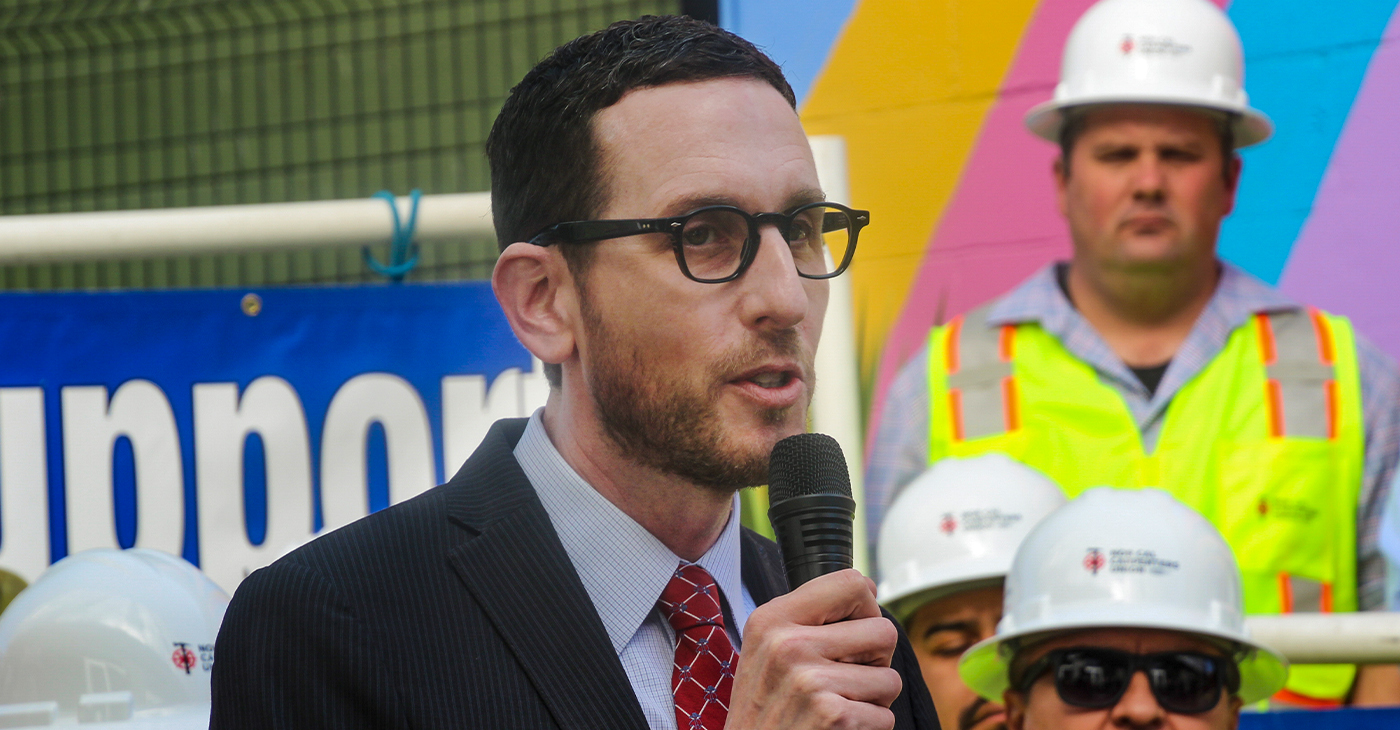BayCityNews
MORE THAN WORDS: Lack of Translation Services and Trust Leave Out Voices in Stockton
In February, Griselda Juarez left her work early at Premier Finishing, a company that specializes in painting auto parts for various car makers, and rushed through making dinner for her family so she could attend a quarterly neighborhood meeting with the Stockton Police Department. Juarez, 50, a resident of Weston Ranch in Stockton, faithfully attends every meeting in hopes of receiving answers about adding more grocery stores to the area and discussing crime and safety issues in her neighborhood. But most days, she goes back home without having voiced her concerns.

By Victoria Franco
Bay City News
In February, Griselda Juarez left her work early at Premier Finishing, a company that specializes in painting auto parts for various car makers, and rushed through making dinner for her family so she could attend a quarterly neighborhood meeting with the Stockton Police Department.
Juarez, 50, a resident of Weston Ranch in Stockton, faithfully attends every meeting in hopes of receiving answers about adding more grocery stores to the area and discussing crime and safety issues in her neighborhood. But most days, she goes back home without having voiced her concerns.
Juarez is not a native English speaker, and often there are no translation services available to understand what information is being given and to allow her to ask questions.
“In this last meeting we had with the police, the officer said there wasn’t anyone to interpret, anyone to help us, so I didn’t get anything out of it,” Juarez said in Spanish.
“I felt like I went to waste my time … I went to sit and warm up a chair, as people would say,” she said.
About 45 percent of Stockton’s residents are Latino, with over 40 percent of people in San Joaquin County speaking a language other than English at home, according to the U.S. Census. Many of those who only speak Spanish, like Juarez, are frustrated that language barriers get in the way of public safety information.
Now they are asking city officials to offer solutions and create meaningful connections with Spanish speakers in the area.
The issue goes beyond the meetings. Residents point to the lack of communication and outreach in their language as one of the biggest hurdles to developing trust between the community and the police. That limits the availability of public safety information for an already vulnerable population and restricts their ability to better the community and gain more representation.
A killer on the loose, a gap in communication
The potentially dangerous consequences of language barriers were highlighted last October when Stockton officials held a town hall meeting to discuss the threat of serial killings that had been taking place in the city since April 2021. At the time, seven people had been killed or shot. Five of them were Hispanic men.
During the town hall, city officials told community members about the killings and gave tips on how to stay safe, especially during early morning hours. However, several Spanish speakers in attendance left the meeting disappointed and frustrated because they were left out of the conversation after translating services failed.
This was particularly worrisome for agricultural workers in attendance who were among the most vulnerable because they leave for work in the dark, early mornings, often alone.
“Remember our folks who work in the field, what time do they get up?” said Luz Sauceda, health educator for El Concilio, a non-profit organization that offers a multitude of services primarily to the Hispanic population of the Central Valley.
Mayor Kevin Lincoln said following the meeting that another town hall was held specifically for the Spanish-speaking community, and he invited other community stakeholders as well.
“I hear you; your city hears you,” said Lincoln in response to people feeling left out of the meeting. “We’re here to serve you and to do the best we can to meet you where you’re at, at the point of your needs.”
Translation challenges
Stockton police say that when they host a meeting or town hall, they rely on members of the Chief’s Community Advisory Board, a group created in 2012 to improve communication, trust, and collaboration between Stockton residents and the police, to assist with translations while at events.
But at the Feb. 14 quarterly neighborhood meeting there was no one available to help with translations.
Juarez and Ernestina Barrios, another Stockton resident, said that Zoyla Moreno, a neighborhood watch captain for Weston Ranch, has tried to translate for them.
However, it is often hard to follow and ends up creating a more stressful environment.
Their complaints focused on the quality of the translation and the absence of earphones with which to listen to it. Barrios said that at one meeting in particular, an English speaker had said they couldn’t hear the meeting or pay attention because of the talking and translation happening next to them, which made Barrios feel awkward.
“I think that’s the problem,” said Barrios. “Because the woman is translating but she’s not going to be next to me, right? Instead, she has to talk sitting up, not telling me in my ear. So then, I think, the people who are next to me are interrupted in hearing as well.”
Although Moreno stepped in to translate for the women, she is not a certified translator, nor does she have the qualifications to translate at meetings. Barrios said it was difficult for Moreno to interpret during the meeting because she had to pay attention to what was being said.
Both women said they would like to see the Stockton Police Department bring back earphones that were previously used for Spanish speakers to listen to a translation of the meeting. Joseph Silva, a spokesperson with the Stockton Police Department, said in March that the department had recently purchased earphones that would be used at upcoming meetings.
In the neighboring city of Lodi, earphone transmitters and receivers were useful in overcoming language issues during meetings and hearings.
Rosa Trevizo, a State of California Certified Court Spanish Interpreter, attends every City Council meeting to ensure that Spanish speakers can understand the meeting and she helps them speak during public comment.
She said she has been a city translator for eight years and goes to the meetings whether or not people request translations service in advance.
In a special City Council meeting in March, Trevizo gave more than 20 people headphone receivers where they were able to hear her translate the more than three-hour meeting about who would be selected to fill a vacancy in District 4 on Lodi’s East Side — after a previous council member was accused of voter fraud.
Hispanic community members who were angry about the possible election fraud and who wanted to have a voice in a successor were able to address the council with the help of Trevizo.
Stockton city officials say they are working on other services, including a citywide web page that would use Google translation services, as well as translation service through Amazon to give residents bilingual options when they access the website for information and updates. People will be able to choose the language they prefer.
Beyond translation
Despite web pages being translated, Barrios said she feels that more meetings need to be held in Spanish or with translation services.
“I don’t think it’s fair, I want the Latino voice to count, one’s voice as Hispanic,” she said.
Spanish speakers in the community said they believe another way to begin closing the gap between the language barriers is by city officials and police building a connection with the community to foster trust.
“Dialogue is good, forums are good, but you have to do work beforehand and develop the trust of the people,” said Luis Magana, an advocate for farmworker justice in the Central Valley.
Magana has seen the benefits of this approach before. He recalled a former police chief in San Joaquin County who didn’t speak any Spanish but was able to connect with the Hispanic community by showing he cared about the problems they faced.
For Magana, knowing that the authorities care enough to engage with the community, even if they don’t speak the language themselves, can open many doors.
“He spoke with us, and Spanish is not necessary when people can feel the trust and the willingness,” he said.
Magana said although some city officials do outreach in the community, he feels that it must occur consistently, and he would like to see more follow-through from city leaders.
Juarez said that although she and her Latino community continue to face obstacles with language barriers when it comes to public safety issues, she will continue to attend every police meeting because she wants it known that Spanish speakers matter and that they deserve representation — hoping that more visibility will lead to lasting change.
“I believe that even if we don’t understand, (we should go) so they see us and see that people are interested,” said Juarez. “Many people don’t go to the meetings, and I tell them we should go, even if we don’t understand, but have them see us, have them see that we’re interested, that we want to change our neighborhood and do new things.”
Copyright © 2023 Bay City News, Inc. All rights reserved. Republication, rebroadcast or redistribution without the express written consent of Bay City News, Inc. is prohibited. Bay City News is a 24/7 news service covering the greater Bay Area.
Bay Area
Arrests Made at People’s Park as Preparations For Construction on Site Begin Again
Seven people were arrested early Thursday morning at Berkeley’s People’s Park as fencing was put up in preparation for a controversial construction project to build housing for students and formerly unhoused people on the public park.

By Bay City News
Seven people were arrested early Thursday morning at Berkeley’s People’s Park as fencing was put up in preparation for a controversial construction project to build housing for students and formerly unhoused people on the public park.
Fencing and double-stacked shipping containers will continue to be installed over the next three to four days and surrounding streets will be closed off for about six days, according to a university spokesperson.
Opponents fought the University of California, Berkeley’s plan to build on the site when construction began in August 2022, but they were dealt a setback when Gov. Gavin Newsom signed a bill last year that was unanimously backed by the state Legislature to exempt the university from a requirement to consider alternative sites for the project.
The arrests Thursday morning were for trespassing, with two also arrested for failure to disperse, according to the university. They were cited and released after being booked into jail.
An appeal on the university’s construction project is still being heard by the state Supreme Court, but the university said it has the legal right to close off the construction zone while the case is litigated.
“Given that the existing legal issues will inevitably be resolved, we decided to take this necessary step now in order to minimize disruption for the public and our students when we are eventually cleared to resume construction,” UC Berkeley Chancellor Carol Christ said in a statement.
“Unfortunately, our planning and actions must take into account that some of the project’s opponents have previously resorted to violence and vandalism, despite strong support for the project on the part of students, community members, advocates for unhoused people, the elected leadership of the City of Berkeley, as well as the Legislature and governor of the state of California,” Christ said.
The plan calls for building housing for 1,100 students and a separate building with 100 apartments for low-income, formerly unhoused people, but activists have fought against the displacement of unhoused people currently living in the park and development on a green space.
The plan would preserve 60% of the 2.8-acre park’s green space and the park would remain open to the public. People living in the park have been offered transitional housing.
Video posted to social media showed trees being cut down and carried by heavy machinery overnight Wednesday into Thursday morning.
Copyright © 2024 Bay City News, Inc. All rights reserved. Republication, rebroadcast or redistribution without the express written consent of Bay City News, Inc. is prohibited. Bay City News is a 24/7 news service covering the greater Bay Area.
Bay Area
Appeals Court Denies Request to Revisit Berkeley’s Natural Gas Ban
The U.S. Court of Appeals for the 9th Circuit has ruled against Berkeley’s pioneering natural gas ban. In a majority decision filed Tuesday, the court said Berkeley’s ordinance banning gas pipelines in new construction runs afoul of the federal Energy Policy and Conservation Act.

By Kiley Russell
Bay City News
The U.S. Court of Appeals for the 9th Circuit has ruled against Berkeley’s pioneering natural gas ban.
In a majority decision filed Tuesday, the court said Berkeley’s ordinance banning gas pipelines in new construction runs afoul of the federal Energy Policy and Conservation Act.
The act “expressly preempts state and local regulations concerning the energy use of many natural gas appliances, including those used in household and restaurant kitchens,” Judge Patrick Bumatay wrote in the majority opinion.
“Instead of directly banning those appliances in new buildings, Berkeley took a more circuitous route to the same result,” Bumatay wrote. “It enacted a building code that prohibits natural gas piping in those buildings from the point of delivery at a gas meter, rendering the gas appliances useless.”
The Berkeley City Council unanimously approved the first-of-its-kind ordinance in July 2019.
It was designed to combat climate change by reducing natural gas emissions throughout the city by encouraging the use of more ecologically friendly electrical hookups.
“Climate change is an existential threat to our city, our homes, and our future,” Councilmember Kate Harrison, who authored the ordinance, said at the time. “It is time to take aggressive action to reduce our emissions across all sectors.”
The California Restaurant Association sued the city in November 2019, and in 2021 a lower court ruled against the restaurant organization.
In that ruling, the court found that the local ordinance didn’t conflict with federal regulations because it indirectly applied to appliances covered by federal law and that the federal rules should be interpreted so as not to “sweep into areas that are historically the province of state and local regulation.”
Last year, a panel of the 9th Circuit disagreed and ruled that federal law preempted the city’s new ordinance and on Tuesday, the full panel of judges denied a request to rehear the case.
Judge Michelle Friedland, writing the dissenting opinion for the 9th Circuit, said the majority opinion “misinterprets the statute’s key terms” and “needlessly blocks Berkeley’s effort to combat climate change, along with the equivalent laws passed by other local governments. Our system of federalism requires much more respect for state and local autonomy.”
Copyright © 2024 Bay City News, Inc. All rights reserved. Republication, rebroadcast or redistribution without the express written consent of Bay City News, Inc. is prohibited. Bay City News is a 24/7 news service covering the greater Bay Area.
Activism
Newsom Signs 56 Housing Bills to Boost Affordability, Help Tenants
Housing developments will now be more streamlined with less red tape, density laws can be overruled in the interest of housing, and institutions like colleges or religious organizations can now use portions of their property to build housing. Newsom also signed a bill that will please anyone who has tried to rent in California on a limited income: Landlords can now only collect one months’ rent as a security deposit instead of two.

By Katy St. Clair | Bay City News
California Gov. Gavin Newsom on Wednesday signed multiple housing bills aimed at tackling the state’s lack of affordable housing and making it easier for tenants to rent a home in the first place.
Newsom signed a whopping 56 bills into law which he said, “incentivize and reduce barriers to housing and support the development of more affordable homes.”
Housing developments will now be more streamlined with less red tape, density laws can be overruled in the interest of housing, and institutions like colleges or religious organizations can now use portions of their property to build housing. Newsom also signed a bill that will please anyone who has tried to rent in California on a limited income: Landlords can now only collect one months’ rent as a security deposit instead of two.
State Sen. Scott Wiener (D-San Francisco) is especially pleased with the signings, as several of the bills were his, including creating a tax increment financing structure to replace 5,800 affordable homes in San Francisco that have been lost to redevelopment.
“California desperately needs to ramp up housing production and the Governor’s action today helps put us on a path to that goal,” said Wiener in a statement Wednesday.
Of Wiener’s bills, Newsom signed Senate Bill 423, which accelerates the development of affordable housing by strengthening the provisions of SB 35, which will sunset at the end of 2025. SB 35, another bill from Wiener back in 2016, allows projects to go through a simplified and expedited housing approval process in areas that are not on track to meet their housing production goals.
SB 423 continues the momentum of 35, but also includes “strong new labor standards,” such as higher wages and health benefits for workers on housing developments.
Wiener also put forth the San Francisco Replacement Housing Act, or Senate Bill 593, which aims to mend the mistakes of the past by adding affordable housing to neighborhoods that were demolished for growth, displacing their lower-income residents. According to Wiener, examples of these neighborhoods are Japantown, SoMA, and the Western Addition. SB 593 will create 5,800 affordable homes in the city, Wiener said.
Assembly Bill 12 was signed by the governor as well. Assemblymember Matt Haney (D-San Francisco) backed the bill, which expands tenant protections by limiting security deposits to one month’s rent in instead of up to three times the rent.
“Massive security deposits can create insurmountable barriers to housing affordability and accessibility for millions of Californians,” said Haney on social media Wednesday. “Despite skyrocketing rents, laws on ensuring affordable security deposits haven’t changed substantially since the 1970s. The result is that landlords lose out on good tenants and tenants stay in homes that are too crowded, unsafe or far from work.”
Other bills signed by Newsom establish penalties for CEQA abuse, allowing affordable accessory dwelling unit (ADU) condos, and expanding density bonuses, which give developers the ability to increase density above the maximum allowed in a municipality’s General Plan.
“It’s simple math,” said Newsom in a statement released by his office. “California needs to build more housing and ensure the housing we have is affordable.”
For a full list of all the housing-related bills signed by Gov. Newsom, go to http://leginfo.legislature.ca.gov.
-

 Activism4 weeks ago
Activism4 weeks agoOakland Post: Week of March 20 – 26, 2024
-

 #NNPA BlackPress3 weeks ago
#NNPA BlackPress3 weeks agoCOMMENTARY: D.C. Crime Bill Fails to Address Root Causes of Violence and Incarceration
-

 #NNPA BlackPress4 weeks ago
#NNPA BlackPress4 weeks agoFrom Raids to Revelations: The Dark Turn in Sean ‘Diddy’ Combs’ Saga
-

 #NNPA BlackPress3 weeks ago
#NNPA BlackPress3 weeks agoMayor, City Council President React to May 31 Closing of Birmingham-Southern College
-

 #NNPA BlackPress4 weeks ago
#NNPA BlackPress4 weeks agoCOMMENTARY: Lady Day and The Lights!
-

 Activism3 weeks ago
Activism3 weeks agoOakland Post: Week of March 27 – April 2, 2024
-

 #NNPA BlackPress4 weeks ago
#NNPA BlackPress4 weeks agoBaltimore Key Bridge Catastrophe: A City’s Heartbreak and a Nation’s Alarm
-

 #NNPA BlackPress4 weeks ago
#NNPA BlackPress4 weeks agoBaltimore’s Key Bridge Struck by Ship, Collapses into Water















































